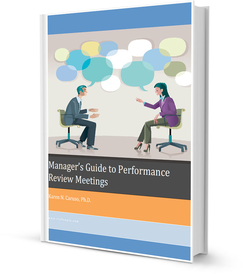4 Ways to Increase the Timely Completion of Performance Reviews
 In order to increase the timely completion of performance reviews across the organization, we must better understand what might be getting in the way and then attempt to proactively address these issues.
In order to increase the timely completion of performance reviews across the organization, we must better understand what might be getting in the way and then attempt to proactively address these issues.
1. The procrastinator does not believe in the process.
Communicate and Build Ownership.
When a buy-in issue causes delays or incomplete performance reviews, we have some work to do. This includes counteracting negative opinions, engaging in constructive dialog about the purpose and importance of the performance evaluation process, and remaining open to feedback about how the process can be perceived as a more positive organizational investment now and in the future. Critics may have a number of followers on board, so it’s best to schedule a handful of group sessions to introduce the process and talk about the benefits and outcomes for the organization. Be sure to emphasize how participation from the entire employee pool is central to realizing these benefits.
2. The procrastinator does not know how to give helpful feedback.
Provide Feedback Training and Resources.
A feedback training program, or even quick tips PDF can minimize most concerns about how to provide feedback that is helpful, meaningful and actionable by the recipient. Many times, managers are not sure how to phrase or word feedback that might be difficult to deliver when it comes time to sit down one-on-one. Training around delivering constructive, specific and detailed feedback that is balanced with a focus on strengths should alleviate concerns about discussing sensitive feedback points.
Other times, managers delay the performance review process when there is not enough information to write a truly meaningful performance review. They have witnessed a certain development need exhibited half a dozen times throughout the course of the year, but now are failing to dredge up a solitary example to be documented on the review. This of course is where technology can be helpful. Performance management systems that facilitate the capture of this type of performance detail throughout the course of the year, as well as multi-rater feedback that invites comments and examples from the larger working group can jog memories and provide the manager with examples to support low ratings.
3. The procrastinator is worried about providing honest feedback.
Address Trust Issues.
When the status shows high percentages outstanding in the upward feedback column, you may be seeing evidence of unease amongst those participants providing feedback to their managers or others in a position of authority. While it may seem unnatural to provide upward feedback at first, the information is often crucial to leadership, coaching and development competence within the leadership ranks of an organization. Further, participants who are able to provide honest and open feedback without fear of repercussion will be more engaged and embedded in an organization that values their opinion and a manager who appreciates their perceptions of the leadership environment. Take the time to communicate the benefits of upward feedback and to reassure participants that feedback given in a constructive manner will be openly received and acted upon rather than dismissed or rebuked.
4. The procrastinator is confused or overwhelmed with what needs to be done and when.
Simplify the Process.
This is often the case in paper-based processes or convoluted online systems. Do everyone a favor and make the process as simple and familiar as possible – especially the first time out of the gate. Overly complex systems are a nightmare for participants and HR. Take advantage of an intuitive automated system that cleanly displays the tasks people need to accomplish, the dates due, and allows them easy access anywhere/anytime. As previously mentioned, supplement the system with links to as much data as possible to help the feedback flow – links to ongoing Goals and Development Plans, Performance History, Development Planning Toolkit/Library, Internal/External Multi-Rater feedback, etc.
Lastly, be sure to communicate to procrastinators that when performance reviews are not completed in a timely manner it sends the message to others that their performance is not important. This of course has negative implications for employee satisfaction, engagement and retention. Ultimately, the timely completion of performance reviews is a critical part of a manager's responsibilities....not an optional administrative activity.
How does your company hold managers accountable for completing performance reviews? Share your thoughts and ideas.
Click here to download viaPeople's eGuide: Manager's Guide to Performance Review Meetings.
Share this
You May Also Like
These Related Stories

How to Implement Upward Feedback in the Performance Appraisal Process

Deal Us In: Everyone Wants in on the Performance Appraisal Process Action



